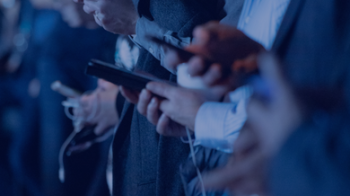To work well with influencers, brands need to chill
Owen Lee
Owen Lee, Digital Investment Account Director at Starcom Mediavest Group writes about brands and how they need to relax when working with influencers.
From their iconic logos to as far as the people that buy their products [1], brands have always wanted complete control of their product and image. Brand managers are even employed for the purpose of ensuring things stay 'on brand'.
Ranging from ad recall through to brand love, there are many consumer benefits to this consistency [2]. The rise of social media has however changed the dynamic of only brands being able to reach and impact large audiences. Many people have now become brands themselves with the audience and clout to have highly positive or damaging impacts on companies.
This capacity of 'Influencers' to outshout brands and impact consumers has caused an erosion of brands' voices, and the control they have over the communications we see and hear. So how should brands engage these Influencers and what needs to change for the future?
The Background
Around 2010-13, companies were spending millions in a social media pissing contest for who could have the most likes and followers. Whilst a separate topic, the relevant oversight was that consumers and not just brands were granted a platform to reach and impact others. Queue social faux pas after faux pas [3], brands not being set up for the maelstrom of complaints, jokes and jibes being had at their expense. This was the first real landmark of brands losing control.
Realising the potential fame and impact they could have, content creators started to garner followings. Now many have a captive audience, with followers and views ranging from a few thousand into the millions [4].
In acknowledgement of their 'influence', marketers now pay these 'Influencers' from £10 (micro-Influencers) to hundreds of thousands of pounds (top tier) to promote their brand [5]. This ability to supplement income alongside media promoted aspirations of careers as a selfie snapper has caused waves to work towards becoming an Influencer - even I obtained a paid job after a 3 month Instagram experiment!!
The Issue
"It takes a lot of great work to get followers, but you can lose them with a single bad post."
The conflict arises with how these brands look to engage these Influencers. Having built up their online persona into a product their followers have bought into and like, these Influencers aren't commodities; they're brands. They have their own guidelines and rules just like the companies that seek to employ them.
Thus, whilst picked for their reach and engagement within particular sectors, by forcing them to amend how they talk to their audience they lose the authenticity the brand is yearning to leverage. Whilst micro-Influencers are often less fussy over brands due to the exciting prospect of payment, higher tier Influencers become more protective as they know the detrimental effect this type of imposition can have on their brand. It takes a lot of great work to get followers, but you can lose them with a single bad post.
The Solution
"...amends and approvals kills creative and successful campaigns, and alienates audiences."
In short, brands need to learn to let go a bit. They're used to having almost complete control of their output, but this new Influencer sector is different. They're not buying media space from which their brand can push their message, they're seeking to leverage the voices of others. Let them speak. Take a bit more time in briefing than the typical few paragraphs and mandatory #tag inclusions, then allow the Influencers be free to create. Endless rounds of amends and approvals kill creative and successful campaigns and alienate audiences.
I'm not saying it's easy, but Influencers need to feel they're working with brands and not just for them in order to do their best work for both parties. Be more rigorous in Influencer selection, and build mutual trust. Companies consistently employ the likes of The Guardian or Vogue to produce 'authentic' advertorials and this is fundamentally no different. Influencers don't want to damage their brand but if you forcibly stifle them, you'll lose both the Influencer's authenticity and your audience.
A few companies are cropping up that are starting to restrict the amount of amends or pre-approvals on Influencers' work. There'll undoubtedly be pushback around brand consistency and safety. However as brands' trust is paid off with better quality and performing work, their understanding of Influencers will grow. With the volume of good work increasing daily, brands will gradually see how to think and behave to succeed in this space
The Conclusion
Influencer marketing is not 'peer-to-peer', it's 'brand-to-peer'. It's just not your brand. Coke would never pull off talking like Microsoft, and similarly forcing an Influencer to talk like your brand just doesn't work.
Just like the Influencers they now employ, brands ultimately are people - well made up of people anyway. And people like feeling in control, particularly when your job depends on it. It's not easy, but relax and place more trust in Influencers and your brand will be rewarded with more authentic campaigns and more engaged audiences.
References:
[1] Abercrombie and Fitch for example were widely known for only making smaller sizes of clothing, not wanting larger people to wear their garments - see report at http://www.businessinsider.com/abercrombie-wants-thin-customers-2013-5?IR=T
[2] See a brief outline of benefits from eCommerce based agency Surefire https://surefiremedia.co.uk/blog/importance-brand-consistency/#
[3] I won't point out any one particular example, but a simple google search for 'brand social media fails' brings up pages of examples
[4] See a list of some great campaigns using different tiers of Influencers- some with just one or two top tier people, and some using hundreds of micro-influencers https://blog.hubspot.com/marketing/examples-of-influencer-marketing-campaigns#sm.00014tku0o2fiet4qf81jhejfifau
[5] With Nielsen reporting that 92% of people trusting peer-to-peer recommendations even if they don't know them, this isn't that surprising. Various influencer stats including this are available at https://www.the7thchamber.com/blog/2016/11/16/top-20-influencer-marketing-stats
Related content
CMA releases guides for platforms, brands & influencers on paid promotions
Learn moreGambling regulator clamps down on ads being misplaced on pirate sites
Learn moreMark Zuckerberg to donate 99% of Facebook stock to charity
Learn moreRetailers see the effect of mobile
Learn more
Fast forward to 2030 with Futurescape
An in-depth exploration of the attitudes, innovations and media shifts that will shape the years ahead and redefine how we advertise by the turn of the decade



